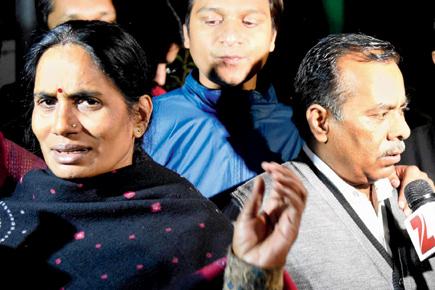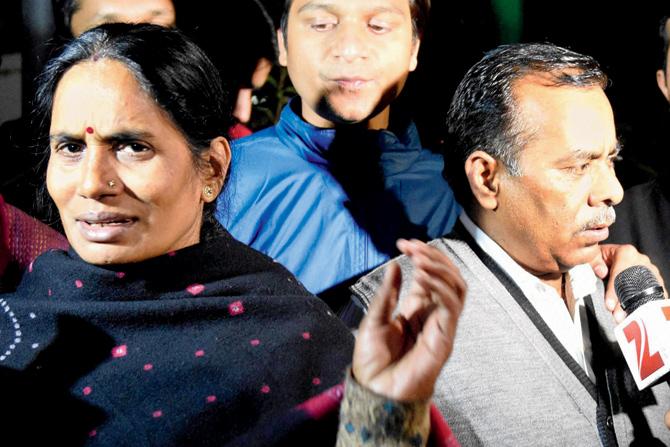The Rajya Sabha on Tuesday passed the Juvenile Justice Bill, which provides for the trial of those between 16 and 18 years as adults for heinous offences

Nirbhaya's parents speak to reporters after leaving the Parliament following the passage of the Juvenile Justice Bill yesterday
New Delhi: Parliament on Tuesday passed the juvenile justice bill, a day after members cutting across party lines agreed that the important legislation should be taken up immediately.
ADVERTISEMENT
However, members of Left parties walked out of the Rajya Sabha before the bill was passed, demanding that it should be sent to a select committee of the house.
The Juvenile Justice (Care and Protection of Children) Bill, 2015 was passed by the Lok Sabha in May.
Asha Devi and Badrinath, parents of the 23-year-old paramedical student who was gang-raped by five men and a juvenile on a moving bus in Delhi on December 16, 2012, were present in the visitors' gallery as the Rajya Sabha took up the bill for discussion.

Nirbhaya’s parents speak to reporters after leaving the Parliament following the passage of the Juvenile Justice Bill yesterday. Pic/PTI
The bill provides for the trial of those between 16 and 18 years of age as adults for heinous offences. Also, anyone between the age of 16 and 18 who commits a less serious offence may be tried as an adult if he is apprehended after he attains the age of 21.
Giving out the bill's details, Women and Child Development Minister Maneka Gandhi said borstals -- a custodial institution for young offenders -- would be set up under the proposed law to house juveniles accused of heinous crimes.
Maneka Gandhi said juvenile crime was being encouraged by the existing law.
"Juveniles' involvement in crime is increasing the fastest. Children walk into police stations and say we have murdered... send us to a juvenile home," she said.
Leader of Opposition in the Rajya Sabha Ghulam Nabi Azad said juvenile convicts should not be kept in jail with "hardened criminals" and there should be a separate place for them.
Parliamentary Affairs Minister M. Venkaiah Naidu, meanwhile, said the government had listed the bill several times in the monsoon session as well as the winter session but it could not be taken up.
"This law will not be applicable in retrospective," he said, which means it will not be applicable on the rape convict who has already been freed.
Members from the Nationalist Congress Party (NCP) and DMK also questioned the hurry in passing the bill, suggesting that it may be sent to a select committee.
However, none of the notices to send the bill to a house panel were presented to Deputy Chairman P.J. Kurien.
Communist Party of India-Marxist leader Sitaram Yechury called it an emotional move.
"If tomorrow, a 15-year 11-month-old commits a crime, will you change the definition again? Today, ISIS is recruiting 14-15 year olds. Are we going to reduce the age from 18 to 16 to 14?" he asked.
"The culprit who has committed the horrendous crime, you cannot punish him. That sentiment of punishing him is there. These are matters that merit a certain consideration. Refer it to a select committee," he said.
Kurien, however, said there was no proposal to send the bill to a panel, after which members of the Left parties staged a walkout.
The bill was passed through voice vote after that.
The mother of the victim, who met Minister of State for Parliamentary Affairs Mukhtar Abbas Naqvi on Tuesday morning, said had the bill been passed earlier, the juvenile convict would not have walked free.
"He (juvenile convict) would not have been released if this bill had been passed six months ago. Though it has been delayed, we want this bill to be passed in parliament at the earliest," Asha Devi told reporters.
The juvenile, who was under 18 years of age when he was held with five other men for the brutal rape and murder, was tried under the Juvenile Justice Act. He was put in a remand home for three years, the maximum permissible under the legal provisions.
He was released from the correctional home on Sunday after completing his sentence, amid protests by the parents of the victim and others in the national capital.
 Subscribe today by clicking the link and stay updated with the latest news!" Click here!
Subscribe today by clicking the link and stay updated with the latest news!" Click here!






